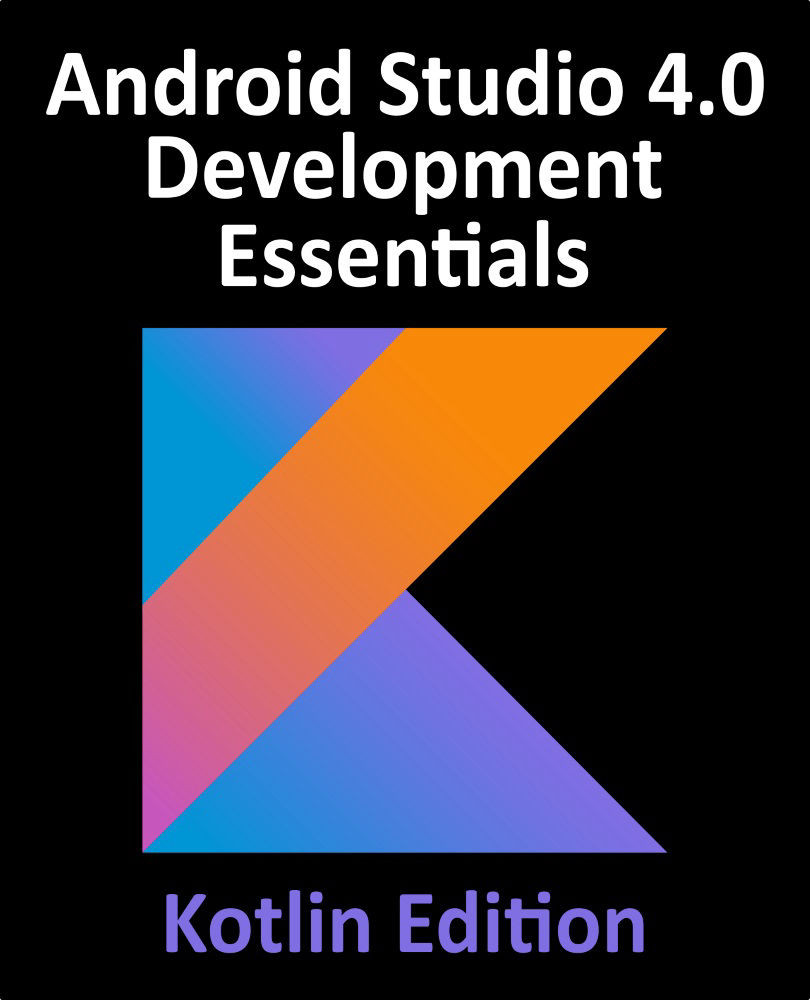-
Book Overview & Buying

-
Table Of Contents

Android Studio 4.0 Development Essentials - Kotlin Edition
By :

Android Studio 4.0 Development Essentials - Kotlin Edition
By:
Overview of this book
Kotlin as an Android-compatible programming language is becoming increasingly popular. Fully updated for Android Studio 4.0, this book will teach you the skills necessary to develop Android-based applications using Kotlin.
Starting with the basics, this book outlines the steps necessary to set up Android development and testing environments, and goes on to introduce you to programming in Kotlin. You’ll practice Java to Kotlin code conversion and explore data types, operators, expressions, loops, functions, as well as the basics of OOP in Kotlin. You’ll then learn about Android architecture components and advanced topics, such as intents, touchscreen handling, gesture recognition, multi-window support integration, and biometric authentication. As you make progress, you’ll explore Android Studio 4.0’s key features, including layout editor, direct reply notifications, and dynamic delivery. You’ll also delve into Android Jetpack and create a sample app project using ViewModel, the Android Jetpack component. Finally, you will upload your app to Google Play Console and model the build process using Gradle.
By the end of this Android book, you’ll be fully prepared to develop applications using Android Studio 4.0 and Kotlin.
Table of Contents (97 chapters)
1. Introduction
 Free Chapter
Free Chapter
2. Setting up an Android Studio Development Environment
3. Creating an Example Android App in Android Studio
4. Creating an Android Virtual Device (AVD) in Android Studio
5. Using and Configuring the Android Studio AVD Emulator
6. A Tour of the Android Studio User Interface
7. Testing Android Studio Apps on a Physical Android Device
8. The Basics of the Android Studio Code Editor
9. An Overview of the Android Architecture
10. The Anatomy of an Android Application
11. An Introduction to Kotlin
12. Kotlin Data Types,Variables and Nullability
13. Kotlin Operators and Expressions
14. Kotlin Flow Control
15. An Overview of Kotlin Functions and Lambdas
16. The Basics of Object Oriented Programming in Kotlin
17. An Introduction to Kotlin Inheritance and Subclassing
18. An Overview of Android View Binding
19. Understanding Android Application and Activity Lifecycles
20. Handling Android Activity State Changes
21. Android Activity State Changes by Example
22. Saving and Restoring the State of an Android Activity
23. Understanding Android Views, View Groups and Layouts
24. A Guide to the Android Studio Layout Editor Tool
25. A Guide to the Android ConstraintLayout
26. A Guide to using ConstraintLayout in Android Studio
27. Working with ConstraintLayout Chains and Ratios in Android Studio
28. An Android Studio Layout Editor ConstraintLayout Tutorial
29. Manual XML Layout Design in Android Studio
30. Managing Constraints using Constraint Sets
31. An Android ConstraintSet Tutorial
32. A Guide to using Apply Changes in Android Studio
33. An Overview and Example of Android Event Handling
34. Android Touch and Multi-touch Event Handling
35. Detecting Common Gestures using the Android Gesture Detector Class
36. Implementing Custom Gesture and Pinch Recognition on Android
37. An Introduction to Android Fragments
38. Using Fragments in Android Studio - An Example
39. Modern Android App Architecture with Jetpack
40. An Android Jetpack ViewModel Tutorial
41. An Android Jetpack LiveData Tutorial
42. An Overview of Android Jetpack Data Binding
43. An Android Jetpack Data Binding Tutorial
44. An Android ViewModel Saved State Tutorial
45. Working with Android Lifecycle-Aware Components
46. An Android Jetpack Lifecycle Awareness Tutorial
47. An Overview of the Navigation Architecture Component
48. An Android Jetpack Navigation Component Tutorial
49. Creating and Managing Overflow Menus on Android
50. An Introduction to MotionLayout
51. An Android MotionLayout Editor Tutorial
52. A MotionLayout KeyCycle Tutorial
53. Working with the Floating Action Button and Snackbar
54. Creating a Tabbed Interface using the TabLayout Component
55. Working with the RecyclerView and CardView Widgets
56. An Android RecyclerView and CardView Tutorial
57. A Layout Editor Sample Data Tutorial
58. Working with the AppBar and Collapsing Toolbar Layouts
59. An Android Studio Master/Detail Flow Tutorial
60. An Overview of Android Intents
61. Android Explicit Intents – A Worked Example
62. Android Implicit Intents – A Worked Example
63. Android Broadcast Intents and Broadcast Receivers
64. A Basic Overview of Threads and AsyncTasks
65. An Introduction to Kotlin Coroutines
66. An Android Kotlin Coroutines Tutorial
67. An Overview of Android Started and Bound Services
68. Implementing an Android Started Service – A Worked Example
69. Android Local Bound Services – A Worked Example
70. Android Remote Bound Services – A Worked Example
71. An Android Notifications Tutorial
72. An Android Direct Reply Notification Tutorial
73. Foldable Devices and Multi-Window Support
74. An Overview of Android SQLite Databases
75. The Android Room Persistence Library
76. An Android TableLayout and TableRow Tutorial
77. An Android Room Database and Repository Tutorial
78. Accessing Cloud Storage using the Android Storage Access Framework
79. An Android Storage Access Framework Example
80. Video Playback on Android using the VideoView and MediaController Classes
81. Android Picture-in-Picture Mode
82. An Android Picture-in-Picture Tutorial
83. Making Runtime Permission Requests in Android
84. Android Audio Recording and Playback using MediaPlayer and MediaRecorder
85. Working with the Google Maps Android API in Android Studio
86. Printing with the Android Printing Framework
87. An Android HTML and Web Content Printing Example
88. A Guide to Android Custom Document Printing
89. An Introduction to Android App Links
90. An Android Studio App Links Tutorial
91. A Guide to the Android Studio Profiler
92. An Android Biometric Authentication Tutorial
93. Creating, Testing and Uploading an Android App Bundle
94. An Overview of Android Dynamic Feature Modules
95. An Android Studio Dynamic Feature Tutorial
96. An Overview of Gradle in Android Studio
Index
